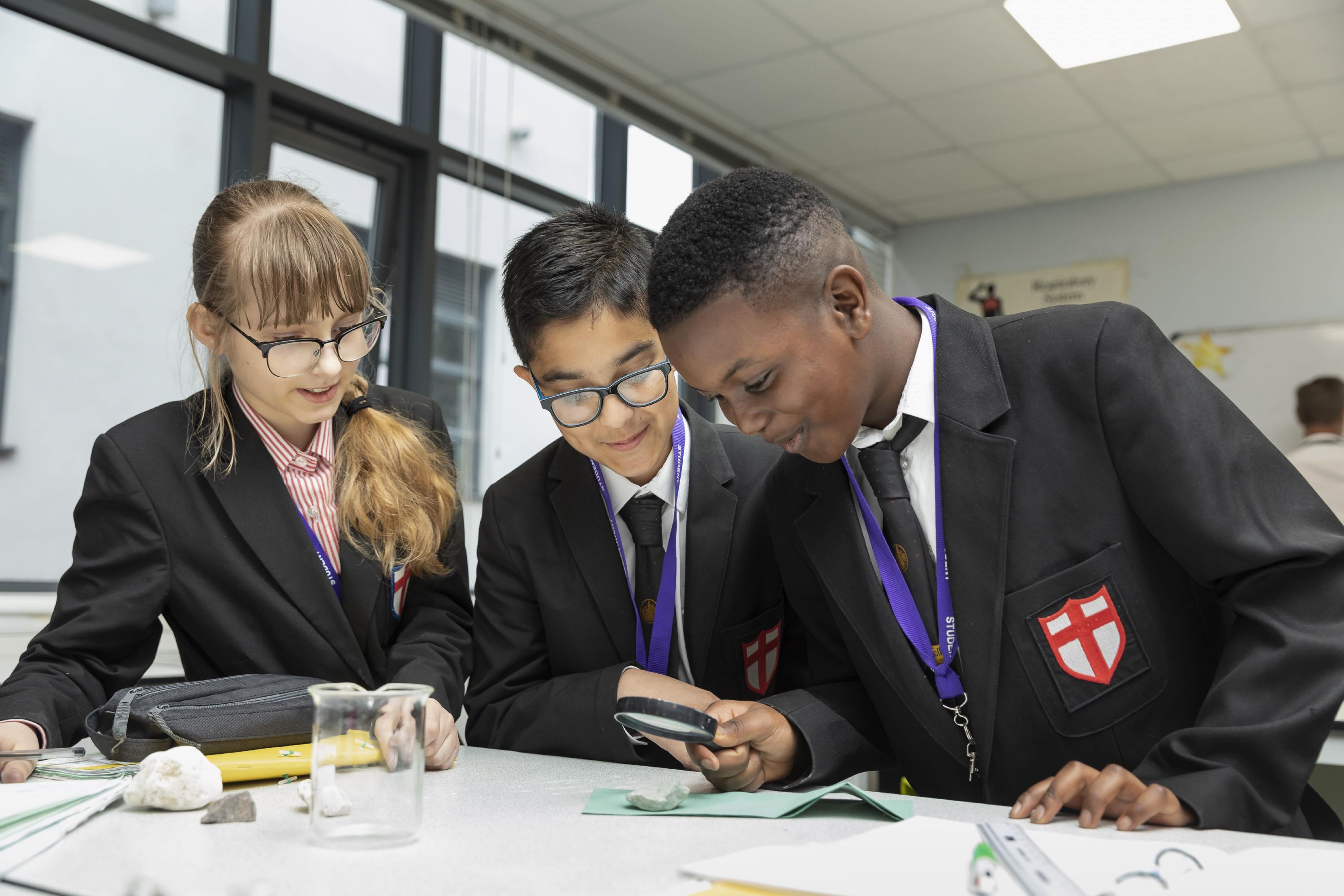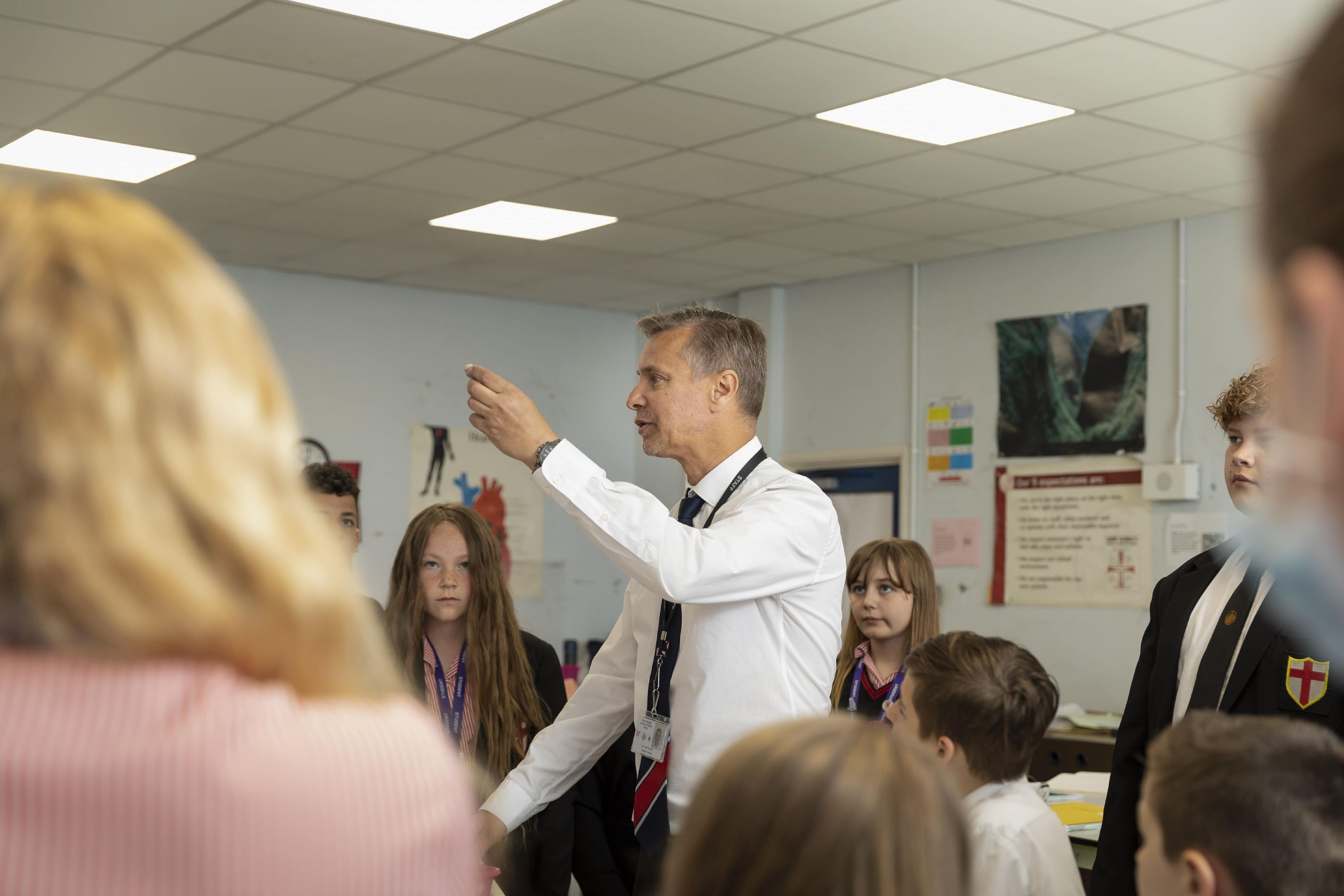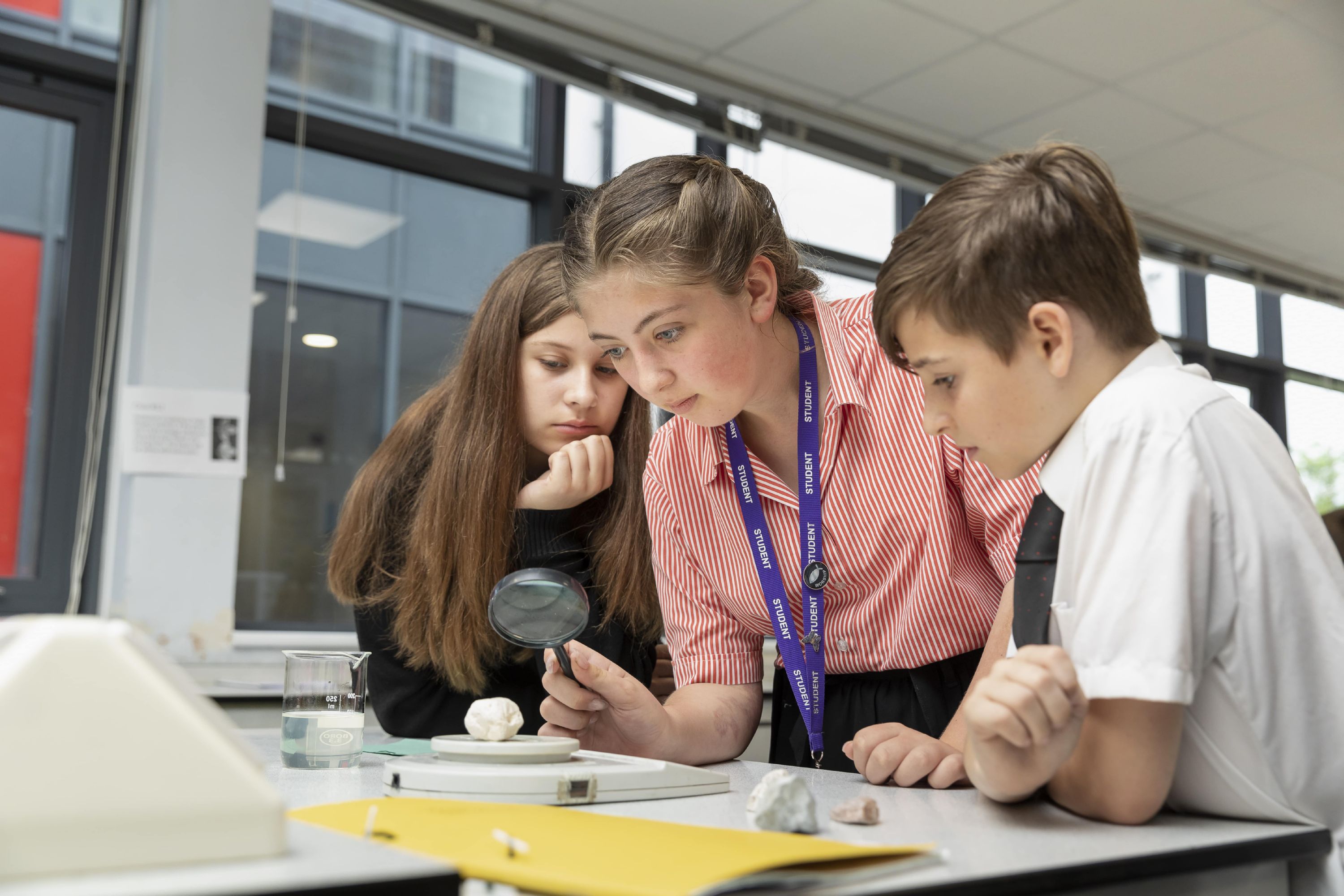Science
Curriculum Leader: Miss A Fry - frya@saintgeorgescofe.kent.sch.uk
The mind that opens to a new idea, never returns to its original size
Albert einstein - physicist
The principal focus of science teaching is to develop a deeper understanding of a range of scientific ideas in the subject disciplines of biology, chemistry and physics.
Intent
Our intention at Saint Georges is to provide every child with the opportunity to explore the ambitious yet accessible Science Curriculum, with confidence, inquisition, and appreciation. We have designed our curriculum to ignite curiosity, encourage wider STEM and extracurricular participation, but most importantly extend beyond school and prepare students fully for future learning, employment, and logical approaches to everyday living to promote opportunities for all to develop and flourish.

Implementation

Our curriculum has been carefully designed to ensure that both skills and knowledge are of equal importance. We seek to continue to develop a broad, rich, and rigorous curriculum that stretches and challenges all of our students delivered via theory and practical settings.
The Science department collaboratively planned out topics in detailed medium-term plans (MTP), which include, where applicable, reference to the requirements of the National Curriculum. These MTP are quality assured by senior leaders to ensure there is a depth of knowledge at Key Stage 3 and that Key Stage 3 forms the building blocks for progression into Key Stage 4 and A-level Sciences. All MTP are mapped from the initial Departmental long-term plan (LTP). Furthermore, part of our rigorous quality assurance systems ensures that the curriculum is evidenced in books and lesson observations, with clear direction as to the subject and paper the content links to. Where there is a need to have flexibility in timescales of delivery for individuals or groups of students this is applied.
Lastly, to ensure consistency not only with our all through school but across our trust, we have established strong primary links which we continue to develop.
To make all of the above possible, we have an established team of science specialists amongst our teaching staff, inclusive of Teach First Trainees, our very own HLTA, and a team of incredibly experienced technicians.
We ensure that SEND and disadvantaged children are given the necessary support in class to access the Curriculum fully and that equal opportunities are given to all.
Impact
To ensure we support our intent and implementation, we have regular, termly assessments constructed with exam marking experience using Exampro and in line with the structure of AQA exams. Each assessment assesses the previous terms' content, inclusive of all 3 sciences to ensure we assess equally across the 3 subjects. These termly assessments are mapped and planned ahead of each term, with ‘assessment windows’ for each year group. Reminders are sent to all students with the date they will be expected to receive the assessment, alongside a detailed breakdown of topics covered and links to pages in the revision guides.
On a wider school focus, students will also be subject to participation in Pre-Public Exams (Mocks) – Y9, Y10, Y11, Y12, Y13 in which students sit real past papers for Science. These are recorded on a system called Pupil Progress which provides detailed reports for all students, as well as providing a breakdown of areas of strengths and development in topics. Similarly, each term, students have access to a quiz on an online exam-style question-based platform called Educake. It is a self-marking homework system that we introduced to provide immediate feedback to students. It provides students with RAG-rated automatic feedback after each Question. There are also PowerPoint slides accessible should further support be required.
Required Practical Placemats are used to record all the skills required in the assessment of these. They are completed in lesson time on ‘Peach Sheets’ and provide students with a quick, accessible view of the required practicals in their books.
SIT/DIRT is evident termly and is completed for all termly assessments. It is direct, personalised feedback to each student based on the knowledge and skills evident in their assessment.

Science in Key Stage 3 (KS3)
Our timetable works on a 2-week rotation with years 7 and 8 receiving 6 hours of science, and year 9 receiving 9 hours.
At Saint Georges, we currently follow the AQA KS3 Syllabus that underpins and supports the AQA KS4 Science GCSEs. It is delivered via engaging lessons, with a practical emphasis and promotes teaching for understanding. It uses a logical order of topics which is based on the equal development of skills and knowledge, as well as using big ideas and mastery goals to equip students for real success at GCSE. Within this, students experience the delivery of a selection of topics across Biology Chemistry and Physics, termly and experience performing required practicals to introduce and embed a concept now used at KS4.
The content is delivered under 10 big idea headings: Forces, Electromagnetism, Energy, Waves, Matter, Reactions, Earth, Organisms, Ecosystems and Genes. Each idea contains four smaller topics: the building blocks for the big ideas.
| Term | Year 7 | Year 8 | Year 9 |
|---|---|---|---|
| 1 | Working Safely, Cells, Plant Reproduction and Cheek Cells. | Photosynthesis, Respiration and Breathing and Digestion. | Cell Biology, Atomic Structure and Energy. |
| 2 | Gravity, Separating Mixtures, Movement and Separating Seawater. | Elements and Periodic Table, Contact Forces and Pressures. | Transport in Cells, Development of the Atom and Power. |
| 3 | Sound, Voltage Resistance Current, Metals and Non-Metals. | Magnetism, Chemical Energy and Types of Reactions and Electromagnetism. | Electricity, Heart and CHD, Group 0, 7 and 1. |
| 4 | Human Reproduction, Variation and Universe. | Inheritance, Evolution and Climate. | Plants, Covalent Bonding, and Domestic Uses of Electricity. |
| 5 | Acid, Alkali, Earth Structure, Speed and Indigestion Remedies. | Earth Resources, Work and Heating and Cooling. | Ecology, Structure and Bonding - Particles, Particle Model and Energy Changes. |
| 6 | Interdependence, Light, Energy Transfers and Cost. | Wave Effects and Wave Properties. | The organisation of an Ecosystem, Chemical Changes and Atomic Structure (Physics version) |
Science in Key Stage 4 (KS4)
Our timetable works on a 2-week rotation with years 10 and 11 receiving 9 hours.
Triple Science is offered as an option starting in Year 10 and students receive 14 hours over the fortnight should they choose this as their option.
| Combined Science and Triple Science Topics | |
|---|---|
|
Biology |
1 – 4: Cell Biology; Organisation; Infection and response; and Bioenergetics. 5 – 7: Homeostasis and response; Inheritance, variation and evolution; and Ecology. |
|
Chemistry |
8 – 12: Atomic structure and the periodic table; Bonding, structure, and the properties of matter; Quantitative chemistry; Chemical changes; and Energy changes. 13 – 17: The rate and extent of chemical change; Organic chemistry; Chemical analysis; Chemistry of the atmosphere; and Using resources. |
|
Physics |
18 – 21: Energy; Electricity; Particle model of matter; and Atomic structure. 22 – 24: Forces; Waves; and Magnetism and electromagnetism. |
GCSE Assessments
Double Award for Science
Combined Science has the option for both a foundation or a Higher Tier. At the end of this course, each student will receive 2 GCSEs.
| Biology Papers (33.4%) | Chemistry Papers (33.4%) | Physics Papers (33.4%) |
|---|---|---|
|
Biology Paper One: Topics 1 - 4 Written exam.1 hour 45 minutes. 70 Marks. Biology Paper Two: Topics 5 - 7 Written exam.1 hour 45 minutes. 70 Marks. |
Chemistry Paper One: Topics 8 - 12 Written exam.1 hour 45 minutes. 70 Marks. Chemistry Paper Two: Topics 13 - 17 Written exam.1 hour 45 minutes. 70 Marks. |
Physics Paper One: Topics 18 - 21 Written exam.1 hour 45 minutes. 70 Marks. Physics Paper Two: Topics 22 - 24 Written exam.1 hour 45 minutes. 70 Marks. |
Exam Board: AQA Combined Science: Trilogy
Triple Award for Science
Triple Science has the option for both a Foundation or Higher Tier, at the end of this course, each student will receive 3 GCSEs.
| Biology (33.4%) | Chemistry (33.4%) | Physics (33.4%) |
|---|---|---|
|
Biology Paper One: Topics 1 - 4 Written exam.1 hour 45 minutes. 100 Marks. Biology Paper Two: Topics 5 - 7 Written exam.1 hour 45 minutes. 100 Marks. |
Chemistry Paper One: Topics 1 - 5 Written exam.1 hour 45 minutes. 100 Marks. Chemistry Paper Two: Topics 6 - 10 Written exam.1 hour 45 minutes. 100 Marks. |
Physics Paper One: Topics 1 - 4 Written exam.1 hour 45 minutes. 100 Marks. Physics Paper Two: Topics 5 - 8 Written exam.1 hour 45 minutes. 100 Marks. |
Science Future Paths
Students can progress further to obtain an A Level in Biology, an A Level in Chemistry, and/or an A Level in Physics.
One of the main misconceptions about science careers is that they all involve white lab coats, Petri dishes and test tubes. This couldn’t be further from the truth as there are a variety of alternative options including Science journalists, Event Managers, Medical Sales, Consultancy, Health and Safety Inspectors, Science Teaching and more.
Extra Resources
The Science department has also purchased an online resource called Kerboodle. Access to this is for all students, and they can access digital textbooks and resources, GCSE Pods which provides video tutorials on topics and required practicals also.
Revision Materials
The Science department is giving you the wonderful opportunity to purchase revision resources to help you with your upcoming assessments. These revision resources will be highly recommended for all students. It is hoped that having these resources will provide additional support for students to independently revise and prepare for assessments & exams.
To buy resources simply bring the cash to the Science Prep room (located opposite lab 4) at the start of break or lunchtime.
KS3 (Years 7 & 8)
- Science Complete Revision Practice Book – Foundation (£6)
- Science Complete Revision Practice Book – Higher (£6)
KS4 (Years 9,10 & 11)
- GCSE AQA Combined Science Complete Revision and Practice – Foundation (£13)
- GCSE AQA Combined Science Complete Revision and Practice – Higher (£13)
- GCSE AQA Combined Science Revision Question Cards All-in-one (£10)
Triple Science
- GCSE AQA Triple Revision Guide Chemistry (£5)
- GCSE AQA Triple Revision Guide Physics (£5)
- GCSE AQA Triple Revision Guide Biology (£5)
- GCSE AQA Triple Revision Cards Chemistry (£5)
- GCSE AQA Triple Revision Cards Physics (£5)
- GCSE AQA Triple Revision Cards Biology (£5)
